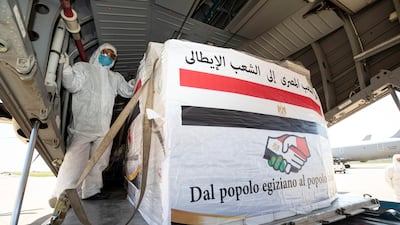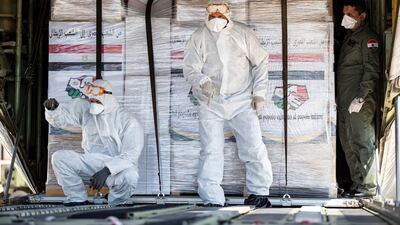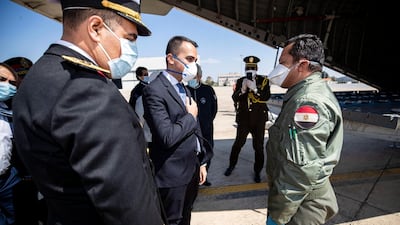President Abdel Fattah El Sisi on Wednesday said his government would introduce harsh measures to contain the coronavirus outbreak unless Egyptians started to follow social-distancing and hygiene practices more diligently.
Mr El Sisi said he was seeking a balance between protecting the population from Covid-19 and maintaining the economy.
“We have been careful in the past period to deal with the crisis in a calm, scientific and balanced manner so that we can safeguard the gains we have made over the past five years,” Mr El Sisi said.
A strict austerity and reform programme was launched in 2016 to overhaul an economy battered by years of turmoil after an uprising forced authoritarian leader Hosni Mubarak to step down in 2011.
“This will never be at the expense of the health of simple workers,” Mr El Sisi said.
The government has been criticised for letting workers return to their jobs, especially the millions involved in massive infrastructure projects.
Critics say those workers have been put at greater risk of contracting Covid-19.
The latest official figures, released on Wednesday night, put the number of confirmed Covid-19 cases at 3,659, of which 276 had died.
These are relatively low numbers for a country of 100 million, but they are rapidly growing and have yet to peak.
Mr El Sisi, quoting weekly figures going back to early March, suggested that the worst may be still to come for Egypt.
The figures showed significant increases in the number of new infections, which rose from 239 cases in the week ending on March 26, to 834 in the week ending on April 9.
Deaths recorded for those two weeks were 17 and 60.
The government has repeatedly said the number of cases and deaths remain within forecasts from the start of the outbreak, but Mr El Sisi found it necessary on Wednesday to deliver a stern warning.
“You must be alert to the fact that we have succeeded in the last period, but we don’t want to lose our gains in the next few weeks,” he said.
“If things change we will be forced to take difficult and cruel measures that are way beyond what we already have. Please, I am addressing everyone.”
The authorities have already closed universities, schools, mosques and churches. They have banned international air travel and imposed a nighttime curfew.
But images of crowded outdoor markets in Cairo and communal taxis and cars packed with passengers not wearing masks have been of serious concern to the government.
On Monday, Egyptians showed uncustomary discipline, sacrificing their traditional outdoor picnics on Sham El Naseem, an ancient and popular holiday that celebrates the arrival of spring.
The government suspended all public transport for the day and all but banned travel between the country’s 27 provinces.
Public parks were closed and access to streets running parallel to the Nile, a favourite picnic spot, was restricted to pedestrians.







